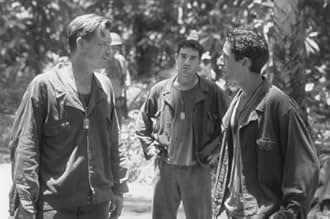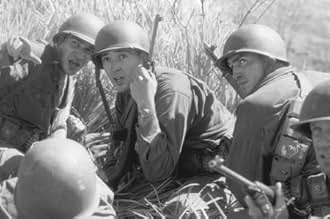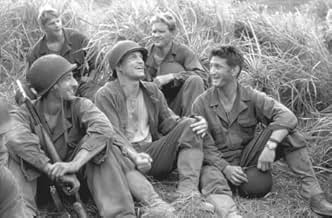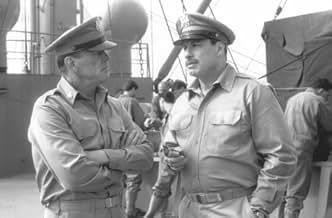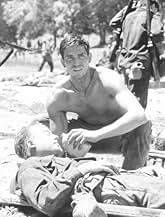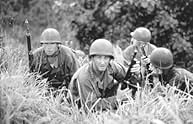Adaptation of James Jones' autobiographical 1962 novel, focusing on the conflict at Guadalcanal during the second World War.Adaptation of James Jones' autobiographical 1962 novel, focusing on the conflict at Guadalcanal during the second World War.Adaptation of James Jones' autobiographical 1962 novel, focusing on the conflict at Guadalcanal during the second World War.
- Nominated for 7 Oscars
- 23 wins & 47 nominations total
- Witt's Mother
- (as Penny Allen)
- Melanesian Villager
- (as Benjamin)
- Director
- Writers
- All cast & crew
- Production, box office & more at IMDbPro
Featured reviews
This story about the Guadalcanal campaign during WW2, based on the James Jones novel, weaves the lives of many characters together seemlessly, creating a philosophical/emotional experience of war. It's not just about war. It's about love, faith in yourself and others, friendship, humanity, morality and also works as a startling indictment of man's conflict with nature. The amazing opening sequence, sets up a tranquility as the character Witt, finds peace on a secluded island among the natives, a peace which is shattered by the war.
What follows is not a mindless battle-after-battle onslaught of pyrotechnics, smoke, dust and blood, but a thought-provoking, visually and verbally poetic analysis of war and humanity. In my opinion it is the greatest war film since Apocalypse now, which I believe bears more flaws than this. It's not an Us-and-Them war story about the glory of the USA defeating the evil Japs. It sticks close with the characters, as we hear the thoughts, their hopes, their fears, leading to a moving experience.
This film was released a few months after Saving Private Ryan and unfortunately did not experience the same attention that the latter film did. Ryan was an excellent film, but to offer a comparison, The Thin Red LIne treads where Ryan didn't dare. Ryan sat in the safe territory of Good vs Evil with a bit of Futility of War and a lot of American Patriotism. It seemed to be more about America at some points than about war. The Thin Red Line is about war, the people involved and the destruction it creates for the mind, the soul and for nature. It does not deviate from this to make simple contrasts and offer easy binary oppositions.
In fact, TTRL is not an easy film. Gasp, it even tries to make you think. Though the title is not really explained in the film, I believe it is implied, and could have many meanings - the line between sanity and insanity, morality and immorality, love and hate, companionship and loneliness, nature and man, war and peace. While the characters share their thoughts, deeply poetic as they are, the meaning is not thrown in your face and neither is the answer to the questions raised. In this way it is the most thought-provoking war film I've ever seen and one of the best films of all time in my book. Top ten easily.
Now to my whinge. I think TTRL was shunned unmercifully at the 1999 Oscars. Shakespeare in Love beat two brilliant films - TTRL and Elizabeth - to get that oscar, and don't get me started on Gwyneth's award. This is the best film of 1998/9, in line with Elizabeth. It's unfortunate that the two, thoug h greatly revered, did not achieve the success and attention they deserved.
Don't be afraid by its length, it's a beautiful journey, full of rich colour, sound and the reward is a deeply moving human experience, unlike any other that the past decade has offered.
Director Terrence Malick's films are alive with a sense of pure cinema with every frame delivering such detail and richness that you could swear you were there. The only other person capable of bringing such an immediate sense of time and place and sheer nuance of film (although in a completely different way) is David Lean, another major league craftsman.
Here, again, Malick uses his customary voice-over device although this time as a means of vocalising the abstract thoughts of the various soldiers as they struggle to make some sense of the conflict. It's an interesting approach which allows the audience to identify with the characters in a far less superficial way than in, say, SAVING PRIVATE RYAN (the film THE THIN RED LINE is most often and most unfairly compared to). Malick is also not afraid to take time to illustrate the continuing natural backdrop to the carnage. Mother Nature almost seems to be occupying a pivotal supporting role as a detached observer on the sidelines, calmly and inscrutably watching the chaos develop.
It's a measure of Malick's complete disinterest with the normal conventions of Hollywood that actors such as Lucas Haas, Vigo Mortensen, Jason Patric, Mickey Rourke, Martin Sheen and Billy Bob Thornton all spent months in Queensland Australia and the Solomon Islands filming roles that ultimately ended up on the cutting room floor. Blink and you'll also miss major marquee players such as John Travolta and George Clooney. The stand-out performances come from Jim Caviezel and, especially, Nick Nolte.
Nolte just seems to be getting better and better as he gets older and his portrayal of tyrant Colonel Tall is something to see. I have never seen anyone express such an impotent sense of rage, anger and fury than Nolte does here. It's a fantastic performance from a real pro and it's a mystery to me why he didn't get an Oscar.
John Toll's pristine cinematography and Hans Zimmer's wonderfully evocative (Oscar-winning) score are other strong elements. The unusual music and visuals contrast so well that Malick sometimes fades out the noise of the shouting, explosions and guns, an effect that only serves to heighten the emotional power of the experience further.
You won't see a more beautiful film about the horrors of war. Movies like this make the task of trawling through the weekly diet of dumb formulaic junk served up by Hollywood almost seem worthwhile.
Malick came in with this pack, concerned with newly emerging ideas about meaning and language. The philosophy establishment was forming a new split (US and Continentals) largely characterized by how to reinvent Wittgenstein's insights but with a more friendly rationale. Chomsky was shaking one world, formal abstraction for computers another. Exciting --- moreso than today. But Malick was not a verbal communicator, nor a logician, nor an academic (all sides of the same thing). So he dove into practical visual semiotics.
He is not a brilliant man, merely a journalist. But he does seem to be particularly honest and understands some damned good, solid, human ideas compared to other filmmakers. One can really see this early MIT exposure in 'Red Line.'
We can thankfully forget plot -- there is not meant to be any story. In fact, the war is only used here as a canvas of motion, abstractions of 'regular' life, colliding and sometimes adhering to souls, sometimes destroying them. The device is to build the film around the sounds: narrative voiceovers (current and remembered), natural sounds, haunting music. The images are attached to the sounds, which are derived from abstractions. This is exactly the reverse of Spielberg, which is why there cannot be any comparison to 'Private Ryan,' or any other film that is 'about' something. It is why Malick can never 'explain' his films.
The execution is hypnotic. I wonder what the six-hour version is like. The editing (and particularly of the sound) is unusual, so transports us beyond the strangeness of tropics, war, history. That editing is much like Van Morrison's music: it establishes the rhythm only as a reference to dance around, peeking in and out. The relationship of the rhythm within the shots to the rhythm of the shots is very bluesy.
Having no story opens new possibilities and creates unfamiliar problems. An opportunity is that the film can have many centers: the meditator in the midst of the attack on the camp; the squabble of the villagers; the transport of the ship; the need to look at our own dogtags. The challenge is how to end. When you stick to a formula like Spielberg, you just turn the crank and the climax lifts and comes down, and the story finishes. No story, no formula, so Malick brackets with the transport to and from the island, by the aging of the southern rookie, and by the exit from and re-entry to a world of unfamiliar characters. That they are played by familiar actors (Travolta, Clooney) oddly emphasizes the point.
It must have been educational to work on this film, which is why every intelligent actor (or an actor with an intelligent agent) wanted to participate: one can see direct influence in Penn's 'The Pledge' and Cusack's 'High Fidelity,' both highly abstract.
Penn knew exactly what he was doing here. He moves in the action, as an actor must. But he places his character offscreen in the abstract voiceovers. That's the 'real' Welsh, and the film's image only an abstraction. He truly understands presenting many dimensions simultaneously. Harrelson doesn't, but that's the point with Keck. I wonder why Depp didn't make the cut?
about the oscars, i only watched the film after its surprise nomination for best picture. i had seen the competition already, and it was time to check out the fifth nominee. i went to the theatre myself, and came out three hours later, went home, and i cried. not only because i was disturbed, but i loved every single character in the film. i wanted to be there for them, cry with them, fight their battle. many people who have watched the film have said the same thing to me.
the Thin Red Line is sometimes painful to watch, but only because of its realistic juxtaposition of humanity, philosophy, and the terror of war. the film does not delve into any historical fact about Guadalcanal, except that the battle itself was terrifying (as is any battle). the characters introduce themselves through voice-over narration, which accompanies much of the action. and speaking of action, there is not much in the film. more images. images of war and the lives these soldiers left behind. this was Terence Malick's intent, of course, and many people were insulted and thought it was his own pretentious self getting the best of him. "boy he's a genius.. must he show it??" sometimes it is a little pretentious, but the film would've been "just another WWII film" if it was out of Malick's hands.
i can not understand why Sean Penn is billed as the top actor or the main character of this film. he was there a lot, but the film is carried by Jim Caviezel as the beautiful and ethereal private Witt. words can not describe this performance. with as few lines as he had, Caviezel portrays the symbolic soul of Witt, and by the end of the film he will break your heart. also excellent performances from Nick Nolte and the understated Elias Koteas, who can stretch creepy (Crash) to sympathetic in the blink of an eye.
now.. let's consider hollywood. sure they love Spielberg, and sure Private Ryan was a masterpiece (and it really was), but nobody even expected the Thin Red Line to get seven oscar nods, especially for best picture. but Shakespeare in Love was the crowd pleaser, and the other two were epic war films. most hollywood "artsy" people are anti-war.. kind of like the Thin Red Line. Private Ryan seemed to be MUCH more patriotic "pro-america" than the other. so if we've got anti-war on one side, and patriotism on the other... open and shut. the votes were split between the two, and Shakespeare emerged victorious. too bad.
anyway... the Thin Red Line was definitely better than Shakespeare, and definitely a completely different film from Spielberg's. John Toll's cinematography and Hans Zimmer's score work together to convey the tone of Malick's lyrical and poetic direction, and both should have won oscars. this film is nothing short of breath-taking, though understandably not for the average american moviegoer.
Did you know
- TriviaMost of Adrien Brody's scenes were cut from the film and he wasn't aware of these changes until he saw the film at the premiere. Brody came to the premiere expecting to see himself as the lead character and was shocked when he saw that he was barely featured in the film, especially since Cpl. Fife was the central character in the novel on which the movie was based.
- GoofsIn one of the flashback scenes where the soldier and his girlfriend are holding hands, modern cars can be seen out the window in the background.
- Quotes
Private Edward P. Train: [narration] This great evil, where's it come from? How'd it steal into the world? What seed, what root did it grow from? Who's doing this? Who's killing us, robbing us of life and light, mocking us with the sight of what we might've known? Does our ruin benefit the earth, does it help the grass to grow, the sun to shine? Is this darkness in you, too? Have you passed through this night?
- Crazy creditsComposer Wrangler. . . Moanike'ala Nakamoto
- ConnectionsFeatured in HBO First Look: The Thin Red Line (1998)
- SoundtracksThe Unanswered Question
Composed by Charles Ives
Performed by Orchestra of St. Luke's (as The Orchestra of St. Luke's)
Conducted by John Adams
- How long is The Thin Red Line?Powered by Alexa
Details
Box office
- Budget
- $52,000,000 (estimated)
- Gross US & Canada
- $36,400,491
- Opening weekend US & Canada
- $282,534
- Dec 27, 1998
- Gross worldwide
- $98,126,565
- Runtime2 hours 50 minutes
- Color
- Sound mix
- Aspect ratio
- 2.35 : 1
Contribute to this page






